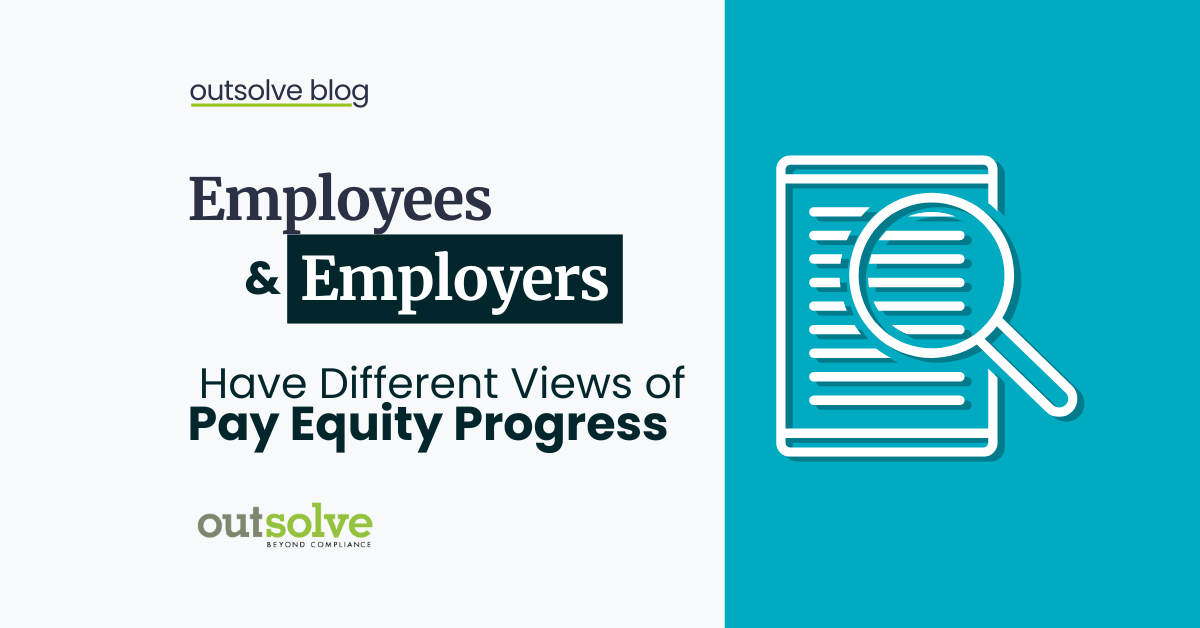2 min read
Employees and Employers Have a Different View of Pay Equity Progress
 Debra Milstein Gardner
:
May 4, 2023 11:29:51 AM
Debra Milstein Gardner
:
May 4, 2023 11:29:51 AM

Current research shows belief in the significance of pay equity initiatives but points to the absence of leadership and lack of transparency as roadblocks
In April and May 2022, the Harvard Business Review (HBR) Analytical Services surveyed 453 company executives regarding their awareness of their organization’s pay equity plans and efforts. They also randomly surveyed 3,005 full-time employees below the senior and executive level. The results were published in a research report titled “Making Pay Equity Work for All.” The report indicated that companies feel they are making progress toward ensuring pay equity among men, women, and underrepresented groups. However, employees and employers “have quite different insights about how their organizations reach that goal and who should be leading those efforts.”
About 75% of executives and 71% of employees agree on the importance of pay equity and that was the only issue on which both groups agreed. Less than half (41%) of employees thought their employers had been successful in achieving pay equity. Additionally, 26% of employees indicated that their employers have been unsuccessful in ensuring equal pay for equal work. Regarding efforts geared towards race, there was a similar dichotomy where half of the white male employees rate the pay equity initiatives within their organization as highly successful whereas only 37% of white women and 35% of Black/African American and Hispanic/Latinx women, and Hispanic/Latinx men share the similar positive view.
The research indicates that where “some companies are taking action to address compensation disparities, all too often a culture of silence, a lack of transparency, and an absence of proper leadership prevent organizations from bridging the pay gap in meaningful and constructive ways.”
Many of the executives (47%) felt the chief human resources officer should ensure pay equity, while only 6% of the employees believed that this role should be responsible for pay equity initiatives. Alternatively, the largest group of employee respondents (37%) and 39% of executives felt that the chief executive or operating officer should head up pay equity efforts.
According to the report, “achieving pay equity is no longer solely a matter of eliminating sex discrimination but an intersectional issue that cuts across race, color, and sexual orientation and requires a deeper examination of varying perspectives and a more granular look at pay data.”
To take a deeper dive into the research, read the entire report.
%20(1).png?width=300&height=80&name=OutSolves%20Take%20(300%20%C3%97%2080%20px)%20(1).png)
As indicated in this valuable research study, the importance of pay equity initiatives, identifying executive responsibility, and proper communication and transparency are the key to advancing pay equity. The report indicates beneficial outcomes including “key benefit of pay equity is improved retention of existing talent (71%), followed by a stronger company culture (60%), greater employee engagement and productivity (60%), improved ability to acquire new talent (58%), and encouraging and increasing workforce diversity.” Many states have recognized the importance of pay equity and transparency and have passed legislation to ensure communication via internal and external job postings of wage and salary information.
To take a proactive view of pay equity efforts, we recommend you regularly evaluate your pay practices to identify and remedy gender and race/ethnic disparities. Pay Equity Analysis Services or other compliance services are available to assist you. OutSolve can be reached at info@outsolve.com or by calling 888-414-2410.
Debra Milstein Gardner has worked in the Equal Employment Opportunity (EEO) and Affirmative Action (AA) space for the past 43 years while working in the public and private sectors in various human resources compliance roles. She began her career working for the Equal Employment Opportunity Commission and then went to the Marriott Corporation for nine years working in EEO, Affirmative Action and field human resource roles. In 1990, Debra founded Workplace Dynamics LLC providing EEO, AA, and DEI consulting services to government contractors. In 2016, Debra sold the affirmative action portion of Workplace Dynamics to OutSolve LLC and works part-time as a Market Analyst. Debra is a sports fanatic, routing for the Baltimore Ravens and all Virginia Tech Hokie teams. She loves to hike and boat in her mountain and lake community of Lake Lure, NC.
Weekly OutLook
Featured Posts

5 Key Compliance Items HR Can’t Afford to Ignore

HR Compliance Checklist: What Every HR Pro Needs to Know
Related Posts

What Texas HB 149 Means for HR Professionals
AI is already changing how companies hire, manage, and evaluate employees in the workplace. For HR professionals, AI is a game changer because it can...

New Jersey Pay Transparency Laws: What You Need to Know
Update: New Jersey proposed updates to its pay transparency law in October 2025. If passed, the requirements will be a first of its kind in that...

Legal Series: Top 4 HR Compliance Trends to Watch in 2026
This article is part of an ongoing legal series designed to provide insight and practical guidance on current and emerging workplace compliance...
